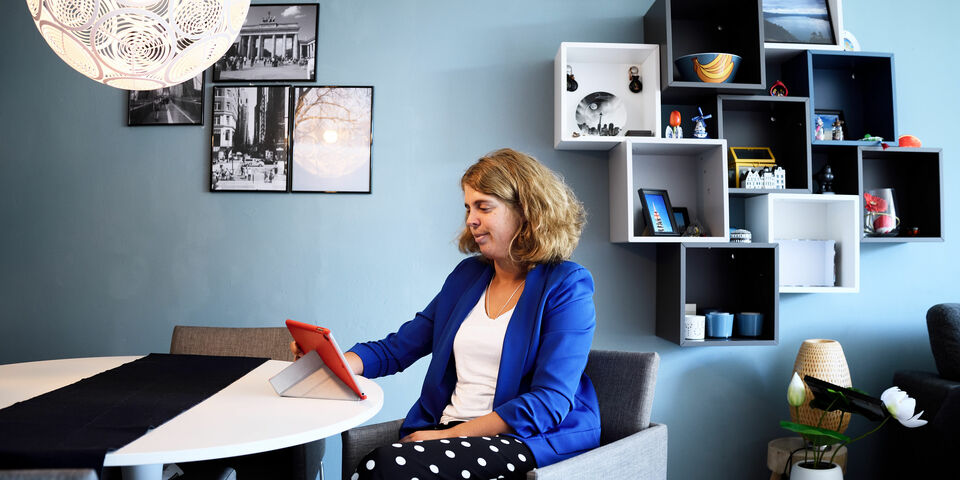"Now that I work from home, I know what my colleagues look like"
Working from home during the corona crisis is slowly becoming our ‘new normal’. We learn to deal with the changed framework and our pitfalls in this situation, find our way in being at home and miss the campus and each other in the meantime like never before. Cursor regularly calls a fellow remote worker to find out what’s up. Today: Lotte de Bitter, copywriter for the Communication Expertise Center, who cannot wait for the corona crisis to end. Being visually impaired, the one and a half meter society is extra challenging for her.
Lotte de Bitter is a positive person. She therefore quickly sees an advantage of the corona crisis and the requirement to work from home. “I can only perceive big things, contrasts and colors. When I meet people in real life, I can only see how tall they are and maybe what hair color they have. Now that we are meeting virtually, I can shamelessly zoom in on my colleagues. I finally know what everyone looks like.”
The Eindhoven-based copywriter has been working for the CEC since January. She writes and translates texts. It sounds like a special job for someone who is visually impaired. She has had this condition since childhood, but her vision suddenly deteriorated ten years ago. Currently it is stable, but it’s uncertain how it will develop in the future.
"I have a very good sense of language, but I am a little slower at reading or proofreading," Lotte explains. When she is at the TU/e, she uses speech software to read and check texts. “At home I zoom in on the screen a lot and flip the colors, so that you get white letters on a black background. This yields a better contrast and then zoomed in, I can read it. But it takes a lot of energy. I know I should actually be doing it with speech, but I'm just a little bit stubborn. Now at home, I can take a few more breaks which is an advantage.”
Done with corona
The benefits of working from home stop there for Lotte, because she is kind of done with the corona crisis: “it is taking too long.” Insulation lurks more for her than for sighted people, she says.
“I live and am alone and feel a bit confined by the intelligent lockdown. You surrender a part of your independence and freedom.” Of course she can go outside and go to the supermarket, but she especially experiences the latter as a major challenge at the moment. The lines on the ground that indicate the desired distance of one and a half meters are not visible to her or sensible to her cane. "If only they would add relief to them." The plexiglass screens often also suddenly appear in front of Lotte, because she cannot perceive them. "I just can't see what's happening one and a half meters ahead of me."
Criminal
So she goes to the supermarket with a friend or family member. “I once forgot my cane and walked with my mother and her shopping cart. They addressed me on this, but when I said that I am visually impaired, it was fine. Yet you almost feel like a criminal.”
Another thing: she can't see facial expressions. To recognize a gruff look when she comes too close to someone: not possible. “Just say something if you notice someone is getting too close. Rather talk about it than having an angry look that I don't see anyway.”
Netflix
When asked what her days at home look like now, laughter is predominant. “I work from home and try to go outside as often as possible. I do workouts via YouTube and take an online Spanish course. The rest of the time I am Netflixing.” How does she manage that while being visually impaired? “I look at a tablet and then I can keep it very close. Audio description tells what happens when there is no dialogue. I also listen to a lot of audiobooks.”
Blogging
Writing for her blog is also an activity she enjoys. “At some point, a story comes into my head and I have to get it out. Then I lie in bed and I think ‘that’s it’. And then I just start writing.”
In her blogs she is open, honest and humorous about her visual impairment. And she might surprise you with a writing style that does not show that she sees very little. The tone is always positive: “I also have bad days, but I don't want to show that in my blogs. I want to convey a message: I am visually impaired, but that doesn't stop me.” She does not want to call herself a role model, "I only want to contribute to the awareness of the topic and teach people what it is like to not see clearly."



Discussion